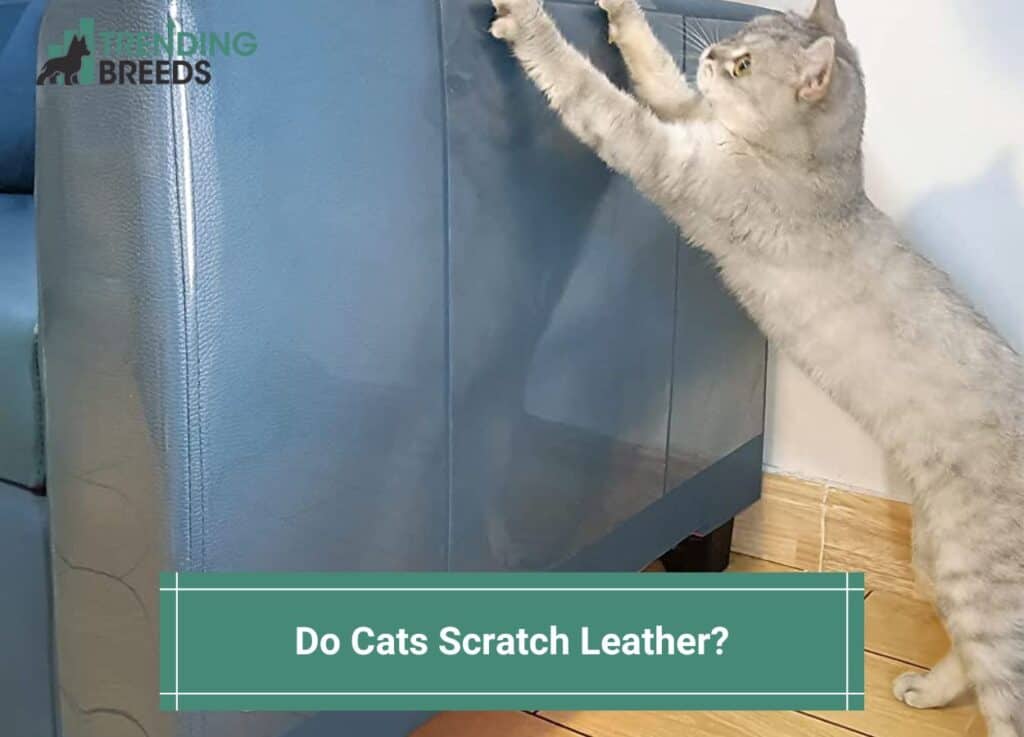
If you’ve ever owned a cat, you know that you aren’t supposed to keep them under the same roof as leather furniture. Cats appear to be drawn to leather furniture before ruining it! You might be wondering, “Do cats scratch leather furniture?”
While cats don’t always scratch the most expensive items in your home, they still gravitate toward the things you don’t want to be scratched. Sharp cat nails have the potential to rip through leather and cause permanent harm.
To prevent cats from scratching leather furniture, offering substitutes or deterrents is essential.
Although it will be a constant struggle to keep your sofa safe from your cat’s pointed nails, you can own a cat and a leather couch in the same home.
In the following paragraphs, learn more about why cats adore leather couches, along with some tips for keeping your couch safe.
Other articles you would like: My Cat Is In Heat And Won’t Shut Up – What Should I Do? and How To Get A Cat Out Of Heat With A Q Tip?.
Do Cats Scratch Leather?
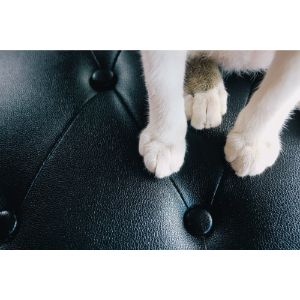
Cats enjoy clawing leather. The fact that leather is enjoyable to scratch draws cats to it. Many other advantages lure cats towards a leather chair or sofa.
The aroma of leather also attracts cats. Regardless of how enjoyable it is to shred leather, your cat continues returning because of its smell.
The perfume that leather emits is faint for humans. Although you could enjoy the fragrance of leather, it does not have the same alluring aroma as it does for cats.
Ways to Stop Cats from Scratching Leather Furniture
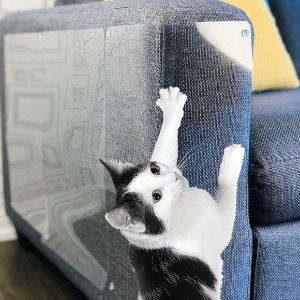
You can do the following things to prevent your cat from scratching your leather furniture:
1. Offer Scratching Alternatives
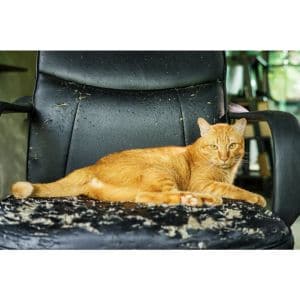
Buy a scratching post or a cat tree with a place for your cat to claw as soon as possible. Your cat will probably prefer another place to scratch over your leather couch.
A scratching post must have the proper texture to be useful. Sisal scratching posts are a fantastic alternative since they are strong and resemble tree trunks, which a cat might claw in the wild.
Additionally, you may buy more pricey hardwood posts or less expensive cardboard ones.
Your cat may prefer scratching leather if you find that they constantly choose your leather couch over your scratch post.
If so, you can try looking for a leather cat scratching post. A tiny piece of leather can also be purchased and fastened to the scratching post to entice the cat to use it.
Additionally, make sure the scratching post you purchase is the right size for your cat. While fully grown adult cats and larger breeds will require taller, more sturdy posts, kittens require a tiny one.
Your cat should be able to stretch out when using the scratching post completely, so it needs to be tall enough.
2. Make Use of Furniture Covers
Despite your best efforts, there are instances when covering up is preferable to preventing cats from scratching leather. You have a few options if you’d like to know how to keep cats off a leather couch:
Plastic Sofa Covers
These plastic coverings completely enclose your couch and shield it from cat claws, vomit spills, and toilet mishaps. You may get extra-thick sofa protectors made to withstand scratching.
Fabric Slip Covers
These waterproof coverings go over your sofa’s front, back, and seating area like a typical couch throw. They can restore an antique couch’s cozy and welcoming appearance and are excellent at guarding against accidents and claw scratches.
Adhesive Furniture Protectors
An adhesive scratch protector that can be put anywhere your cat scratches may be your best alternative if your cat merely scratches the edges of your couch. These come in a variety of sizes.
You must pick a appropriate leather sofa protector for your cat so it can work well.
Aligning the cat scratch protection with where your cat scratches is essential to its effectiveness if they tend to scratch the back of the sofa or the seats of the couch.
You may consider covering your sofa with a blanket if you don’t want to use a cat scratch protector for leather couches. Even this may obstruct your cat’s path and discourage them from using your furniture as a scratching post.
3. Make Use of Scent to Discourage

The sense of smell in cats is 15 times more potent than in people. As a result, many odors overwhelm cats.
Citrus, lavender, cinnamon, mint, and rosemary are a few of the scents that cats detest. Cats also do not appreciate the smell of mustard, pepper, or other spicy foods.
You may use these odors as repellents to prevent cats from clawing furniture.
Several cat repellent sprays on the market use one of these odors to keep cats away. But because leather is so easily ruined, you must apply a repellent designed explicitly for leather furniture.
Making your cat deterrent sprays at home is an option if you are concerned about using chemicals. You can make a rosemary-based repellent to deter cats using the method below:
- Add ten drops of rosemary essential oil, a few drops of dishwashing liquid, and three-quarters of a cup of water to a spray bottle.
- Shake the container with the lid on.
- Spray the mixture on your leather couch.
4. Clean Your Couch
A cat scratches something and leaves pheromones on it. Your sofa is marked as their domain through these pheromones.
A cat may revisit the exact location on your couch to scratch since they can smell themselves on the furniture, because their sense of smell is so strong. Then they’ll believe that this sofa is theirs to damage!
If your cat is clawing your sofa because of this, you must regularly clean it to get rid of their odor.
While managing a tidy home may seem like much effort, it is crucial. If not, your cat’s odor can penetrate the leather deeply, making it challenging to eradicate their undesirable behavior.
Your cat’s scent may be eliminated from your couch with any leather cleaner. If you can, consider using a cleaning solution with a citrus aroma; not only does it get rid of the cat stench, but it also adds a deterrent citrus scent.
5. Make a Vinegar Repellent
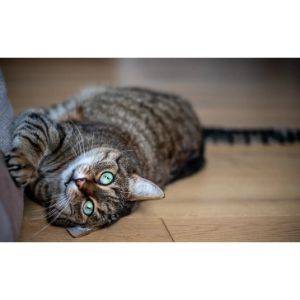
You may also use vinegar as a cat repellent to prevent your cat from scratching your leather furniture. The best vinegar to use is white vinegar, but you must always dilute it with two parts water and one part vinegar.
This makes sure that the smell won’t be overpowering and that your leather couch won’t get damaged.
Always test a tiny area first to ensure that vinegar won’t bleach or discolor your leather sofa before using it all over it. If it doesn’t become damaged, you may spray it weekly.
Try soaking cotton balls or cloth in white vinegar if you find that it does harm your furnishings. Put this in a container, then tuck it beneath the couch’s side. With no chance of damage, the vinegar should still stop your cat from touching your couch.
6. Use Special Cat Scratch Tape
Some people prefer to cover the leather couch with special deterrent tape to prevent the cat from clawing.
A double-sided tape can be used as cat scratch tape. When your cat tries to scratch your sofa, its paws will fall on the side that attaches to the furniture, leaving them with sticky feet.
Cats (or anyone, for that matter) prefer not to have sticky paws. Although they could still try to damage your furniture, they will probably stop once they see that their paws are becoming sticky and move onto another surface.
Although uncomfortable, this is a safe method to discourage cats from scratching and is neither toxic nor dangerous for cats. Always use cat-specific anti-scratch tape. Otherwise, it could be overly sticky and harm your furnishings as well as their paws.
7. Offer More Stimulation and Attention

Because they are bored and require mental and physical stimulation, cats frequently act out. They might also be scratching your furniture to get your attention, thinking that if you catch them doing it to your couch, you’ll rush over to remove them.
There are many ways you can provide your cat with stimulation, but making sure it has plenty of toys and playing with them frequently will help keep it occupied.
There are a variety of cat toys on the market, so discover which one your cat prefers. Cats that are left alone at home benefit greatly from toys with motors and motion sensors since they can play with them independently.
Make some toys out of common household materials if you don’t have the money to purchase new ones.
Cats prefer to hide inside cardboard boxes, which is fantastic for them. Another excellent and affordable method is to use ping-pong balls or attach a stick to some thick thread and drag it around the floor.
8. Trim Claws
To prevent your cat from clawing your leather furniture or other areas of your home, you may also clip your cat’s claws.
Cats frequently scratch furniture when trying to file down and maintain the length of their nails since they don’t enjoy having overly long nails.
You are reducing the need for your cat to scratch your furnishings by trimming their nails. Furthermore, even if they continue to scratch your couch, their small, filed nails won’t likely result in any serious harm.
It is also important to never declaw your cat. Declawed cats may have a variety of behavioral problems.
Due to problems with the nerves in their paws, declawed cats are less likely to use their litter box and might become more prone to biting since they lack their claws for protection.
Never get your cat’s claws removed, no matter how badly you want them to quit clawing your leather furniture.
Frequently Asked Questions
Do Cats Scratch Faux Leather?
Can Cat Scratches in Leather Be Fixed?
So Do Cats Scratch Leather?
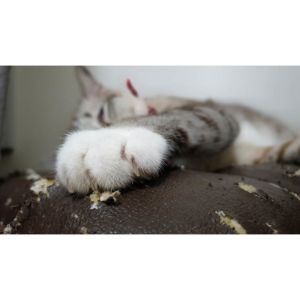
Cats and leather furniture don’t go well together. Your leather furniture is likely to be destroyed in a matter of days.
You can own leather furniture if you have a cat, but you must be prepared if you want it to last in your home.
You will also like:
- Reasons Why Dogs Scratch The Floor & Easy-Fix Solutions
- How To Stop Your Dog From Scratching The Door
- Do Rabbits Have Claws?
If you want to learn more about cat scratching, you can by watching “How To Prevent Cats From Scratching Furniture | Ultimate Pet Nutrition – Cat Health Tips” down below:




